| Srl | Item |
| 1 |
ID:
106380
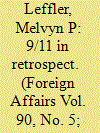

|
|
|
| 2 |
ID:
130558


|
|
|
| 3 |
ID:
109074
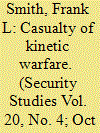

|
|
|
|
|
| Publication |
2011.
|
| Summary/Abstract |
The US military is responsible for protecting its forces from biological weapons. However, the Department of Defense has neglected biodefense-most of the funding for which now comes from civilian organizations rather than traditional military sponsors. Why? I argue that organizational frames explain military neglect and the rise of civilian biodefense. Because the military's frame of reference is defined by kinetic warfare involving projectile weapons and explosives, it neglects non-kinetic capabilities like biodefense. In contrast, the civilian Department of Health and Human Services has a different organizational frame and thus is more amenable to supporting biodefense. I test this theory against realism and bureaucratic interests. I find that research, development, and acquisition for biodefense support the ideational theory of organizational frames, which has important implications regarding the influence of specific ideas on national security policy.
|
|
|
|
|
|
|
|
|
|
|
|
|
|
|
|
| 4 |
ID:
128709
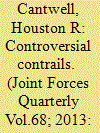

|
|
|
| 5 |
ID:
100432
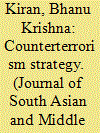

|
|
|
| 6 |
ID:
121183
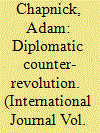

|
|
|
| 7 |
ID:
132129
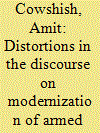

|
|
|
|
|
| Publication |
2014.
|
| Summary/Abstract |
The strategic discourse on defence and security matters in India revolves around familiar themes and sub-themes, ranging from larger issues such as the absence of a clearly articulated national security policy to somewhat fractious issues such as the higher defence management, civil-military relations and modernization of the armed forces.
|
|
|
|
|
|
|
|
|
|
|
|
|
|
|
|
| 8 |
ID:
131288
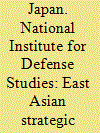

|
|
|
|
|
| Publication |
Tokyo, Japan Times, 2014.
|
| Description |
xv, 359p.Pbk
|
| Standard Number |
9784789015615
|
|
|
|
|
|
|
|
|
|
|
|
Copies: C:1/I:0,R:0,Q:0
Circulation
| Accession# | Call# | Current Location | Status | Policy | Location |
| 057791 | 355.0095/JAP 057791 | Main | On Shelf | General | |
|
|
|
|
| 9 |
ID:
083746
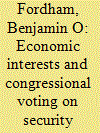

|
|
|
|
|
| Publication |
2008.
|
| Summary/Abstract |
Most research on congressional consideration of foreign and defense policy concludes that ideology is the most important influence on roll-call voting and that constituent economic interests are not very important. This article challenges this conclusion on two grounds. First, most previous research conceives of constituent economic interests on these issues very narrowly, examining only the benefits constituents obtain from providing military goods and services rather than their economic stakes in the broader goals of national security policy. Second, the effect of ideology on congressional voting has changed enormously over time, a fact that poses difficulties for research that has stressed this consideration. The effects of broader economic interests and the changing implications of ideology are tested using a sample of key Senate votes on military resource allocation, intervention, and foreign aid from 1947 through 2000.
|
|
|
|
|
|
|
|
|
|
|
|
|
|
|
|
| 10 |
ID:
120175
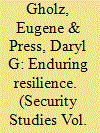

|
|
|
|
|
| Publication |
2013.
|
| Summary/Abstract |
Plentiful spare capacity persists in the oil production and tanker industries, contrary to Michael Levi's contention in his response to our earlier article, "Protecting 'The Prize.' " OPEC leaders retain excess capacity to minimize cartel members' cheating, and tanker companies retain considerable flexibility that allows them to adapt to political-military and other fluctuations in the market. Oil supplies are not on a knife-edge; exaggerated claims of energy vulnerability distort U.S. national security policy.
|
|
|
|
|
|
|
|
|
|
|
|
|
|
|
|
| 11 |
ID:
124104


|
|
|
|
|
| Publication |
2012.
|
| Summary/Abstract |
The article offers comments on the need for a strategy and policy to respond to cyber attack as it is allegedly impossible to block every cyber attack. It is suggested that the industries learn from the vulnerability of the networks attacked while understanding that there is no single defense against a sophisticated and constantly morphing offense. Comments on cyberspace having no boundaries and changing constantly and the need to formulate active defense are also included.
|
|
|
|
|
|
|
|
|
|
|
|
|
|
|
|
| 12 |
ID:
127177
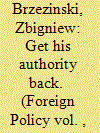

|
|
|
| 13 |
ID:
106266
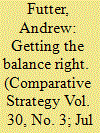

|
|
|
|
|
| Publication |
2011.
|
| Summary/Abstract |
Barack Obama has rightly embraced ballistic missile defense (BMD) as an important component of U.S. national security policy in an era where the requirements of nuclear deterrence are fluid and nuanced. Moreover, the deployment of these defenses may even provide several important benefits to the President's much-publicized nuclear nonproliferation and disarmament agenda. However, if the President's commitment to these goals is to remain credible and viable, then the importance of BMD against rogue states must be balanced with the need to avoid jeopardizing relations with key strategic competitors. As such, the President may have to limit U.S. BMD plans in the near future.
|
|
|
|
|
|
|
|
|
|
|
|
|
|
|
|
| 14 |
ID:
104180
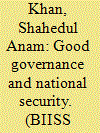

|
|
|
| 15 |
ID:
121968
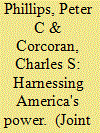

|
|
|
| 16 |
ID:
155557
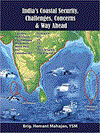

|
|
|
|
|
| Publication |
Pune, Madhavi Prakashan, 2017.
|
| Description |
xvi, 336p.pbk
|
|
|
|
|
|
|
|
|
|
|
|
Copies: C:1/I:0,R:0,Q:0
Circulation
| Accession# | Call# | Current Location | Status | Policy | Location |
| 059213 | 359.54/MAH 059213 | Main | On Shelf | General | |
|
|
|
|
| 17 |
ID:
147018
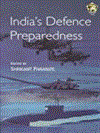

|
|
|
|
|
| Publication |
New Delhi, Pentagon Press, 2016.
|
| Description |
viii, 244p.hbk
|
| Standard Number |
9788182749016
|
|
|
|
|
|
|
|
|
|
|
|
Copies: C:1/I:0,R:0,Q:0
Circulation
| Accession# | Call# | Current Location | Status | Policy | Location |
| 058782 | 355.033054/PAR 058782 | Main | On Shelf | General | |
|
|
|
|
| 18 |
ID:
118008


|
|
|
|
|
| Publication |
New Delhi, Routledge, 2013.
|
| Description |
xv,184p.hbk
|
| Standard Number |
9780415832083
|
|
|
|
|
|
|
|
|
|
|
|
Copies: C:2/I:0,R:0,Q:0
Circulation
| Accession# | Call# | Current Location | Status | Policy | Location |
| 057061 | 355.033054/PAR 057061 | Main | On Shelf | General | |
| 057673 | 355.033054/PAR 057673 | Main | On Shelf | General | |
|
|
|
|
| 19 |
ID:
080767


|
|
|
|
|
| Publication |
2008.
|
| Summary/Abstract |
Due to a strong "Can Do" spirit and a well-engrained, albeit simplistic, notion of civilian control over the military, senior military leaders are disinclined to publicly share their disagreement with emerging national security policy. Many senior officers mistakenly believe that there are no alternatives other than just silently executing, resigning, or retiring when confronted with bad policy formulation. There are, however, options available to senior uniformed leaders when confronted with policy formulation that they, in their professional opinion, believe is flawed. Depending on the degree to which the civilian authorities are receptive to military advice and the magnitude of the threat to national security involved in the policy, senior military leaders can choose among many alternatives to widen the policy debate
|
|
|
|
|
|
|
|
|
|
|
|
|
|
|
|
| 20 |
ID:
178961
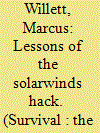

|
|
|
|
|
| Summary/Abstract |
Russia’s SolarWinds hack appears to constitute reconnaissance and espionage of the sort that the US itself excels at, not an act of war.
|
|
|
|
|
|
|
|
|
|
|
|
|
|
|
|